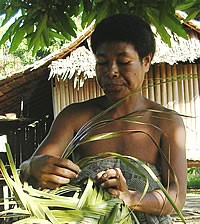Wataluma in Papua New Guinea

Photo Source:
Anonymous
|
Send Joshua Project a map of this people group.
|
| People Name: | Wataluma |
| Country: | Papua New Guinea |
| 10/40 Window: | No |
| Population: | 900 |
| World Population: | 900 |
| Primary Language: | Kaninuwa |
| Primary Religion: | Christianity |
| Christian Adherents: | 100.00 % |
| Evangelicals: | 20.00 % |
| Scripture: | Portions |
| Ministry Resources: | Yes |
| Jesus Film: | No |
| Audio Recordings: | Yes |
| People Cluster: | New Guinea |
| Affinity Bloc: | Pacific Islanders |
| Progress Level: |
|
Introduction / History
The Kaninuwa live in the villages of Sivesive and Kikwanauta. Both villages are located in the north of Goodenough Island, in the province of Milne Bay, southeast Papua New Guinea, around the Catholic mission station of Wataluma. This people group are dedicated to the cultivation of their gardens. They produce taro, yam, sweet potato, sago, and fruits such as coconut, bananas, pineapple and papaya. They also raise chickens and pigs, and fish in the sea. They sell some of the products from their gardens at the Wataluma market, and some people sell them in the provincial capital of Alotau.
The house style of the Kaninuwa people has been changing with the introduction of new materials and architectural styles. Houses are constructed on wood stilts. Roofs are perched and covered with sago palm leaves or sheets of tin. The walls are made of the bark of saksak (sago palm), and the floor is made of the bark of the limbum tree (another kind of palm tree). On average, the household size is 6 people.
Although they are a small group, they are very proud to be Kaninuwa. They have strong feelings for their own language, and they have education in the vernacular during the first three years of primary school. Due to the fact that they are located very close to the Wataluma Catholic Station (where there is a primary and secondary school), many of the Kaninuwa have attended school up to grade 6, 8 or 10.
The majority of the Kaninuwa call themselves Christians, and approximately half of them attend the United Church in Sivesive. However, many keep practicing magic for success in their gardens and hunting. There is not a Bible in their mother tongue.